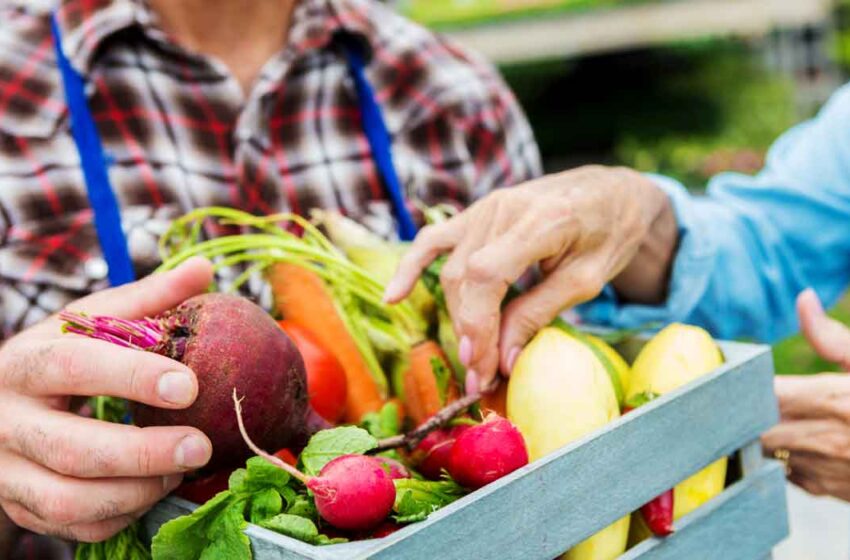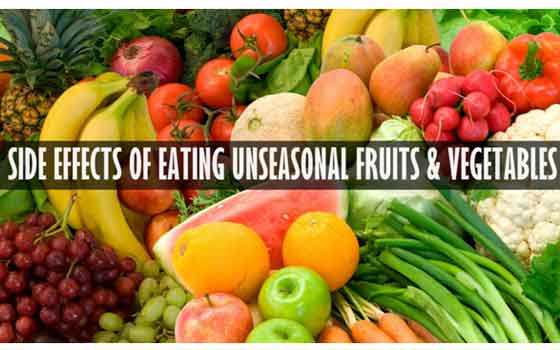Side Effects Of Eating Unseasonal Fruits And Vegetables

Unseasonal Fruits And Vegetables

Since our childhood, elders have been telling us that everything happens for a reason and at the right time. The same thought applies to everything in the universe, whether it’s fruits, vegetables, animals, or humans. People used to eat what was readily available when there were no advanced technologies and methodologies to preserve foods. However, the advancements in the scientific technology field have changed everything over the last few decades. Now, human beings can easily get what they want to consume, irrespective of the season. But have you ever asked the question ‘is it safe to eat nonseasonal foods’? Well, let’s find out the answer to this question. Also, we will check out the possible side effects of eating nonseasonal fruits and vegetables.
Are Nonseasonal Fruits & Vegetables Health-Friendly?
According to different medical studies and research, eating nonseasonal fruits and vegetables is not good for health. There are several different reasons to support this theory. Furthermore, seasonal fruits and vegetables are fresh and cultivated using traditional farming methods. So let’s check out the possible health risks of consuming nonseasonal fruits and veggies.
Top Reasons To Avoid Unseasonal Fruits & Vegetables
According to various health experts, here are some of the reasons to avoid eating nonseasonal fruits & vegetables.
Nutrition
All the things in this universe have a particular shelf-life, which includes fruits and vegetables too. Thus, vendors use different artificial-preservation methods to store nonseasonal fruits and veggies in an off-season. These methodologies include storing in cold storage, coating them with wax, adding chemical preservatives to increase shelf-life, and ripening compounds. Furthermore, transportation of the non-seasonal foods may take several weeks or a few months due to foreign import or export.

Thus, these foods are naturally prone to lose their essential nutrients with time. Moreover, longer transportation times increase the chances of contamination by harmful bacteria and fungus. So people can easily get stomach infections, diarrhea, or food infection upon consumption of these non-seasonal foods.
Highly Contaminated
Fruits and vegetables grow naturally during their season only. Thus, people use artificial cultivation methods to grow them during an off-season. Thus, the cultivators use chemical fertilizers and harmful pesticides for growing and protect these foods in non-seasonal times. This is why these foods become highly toxic and contaminated with other harmful substances. So their consumption can easily result in long-term health problems. Also, people often experience temporary health issues like diarrhea and food poisoning, after consuming nonseasonal foods.
Not Fresh
Since our childhood days, our elderly have always advised us to consume fresh foods only. This is because fresh foods are not only more nutritious but also free from harmful bacteria and viruses. Furthermore, seasonal fruits and vegetables offer special health benefits accordingly. For example, the vegetables that grow in winter are an excellent choice for cold-fighting soups. Furthermore, the fruits grown in summer are very effective to keep our bodies cool and fresh. Therefore, one can easily fall sick by consuming non-seasonal fruits and veggies.
Poor Taste
Non-seasonal fruits and vegetables have poor taste because of long-term preservation. This happens mainly because of cold storage preservation, wax coatings, and chemical preservatives. Furthermore, they even lose their nutrition and taste-providing elements because of harmful chemicals and preservatives. On the other hand, seasonal foods offer original taste and feel due to their natural freshness. Also, non-seasonal foods can always affect health in a bad way rather than a good one.
High Prices
Non-seasonal fruits and vegetables are often sold at high prices due to low availability in the market. Although this is not a health side-effect, yet it is a big reason to avoid buying and consuming nonseasonal foods.
Environmental Degradation
The use of cold storage, harmful pesticides, and transportation, nonseasonal fruits and vegetables also leads to environmental degradation. Thus, it ultimately affects our health through pollution and contaminated foods. So it’s very essential to avoid eating non-seasonal foods and support the local farmers by eating seasonal ones only.
The Takeaway!
So these were the main reasons to avoid eating nonseasonal fruits and vegetables. We all must understand that eating healthy foods is more important than focusing on your taste buds. Thus, we must adopt the habit of consuming fresh fruits and vegetables regularly to boost our immunity and overall health.



